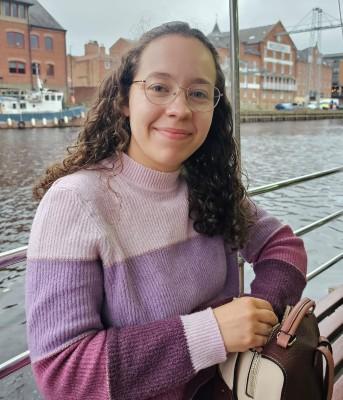Inside the lab with Ellie
Can you tell us what your research is all about?
I’m using a very exciting and cool model called human gut ‘organoids’ to study the activities of the CF protein (CFTR). I can use them to test how the human gut responds to challenges like inflammation or drug treatments and to shed light on the effect of CFTR dysfunction in the intestine. Organoids are a promising alternative to traditional animal models or 2D cell lines, opening new opportunities for understanding disease.
Organoids sound interesting; can you tell us more about them?
Organoids are 3D clusters of cells derived from stem cells in biopsies from patients. You can see fully grown organoids by eye as tiny dots in the plates where they grow - the largest is about the size of the tip of a pencil.
Gut organoids look and behave like miniature versions of the human gut. The organoids I’m working with come from different parts of the intestine – and look very different when viewed through the microscope. For example, organoids from one part of the small intestine look smooth and balloon-like, whereas for others, the surface looks very uneven and folded. They also behave differently depending on the person who donated the tissue biopsy. This means we can study how drug responses and disease mechanisms differ between individuals.

What’s a typical day like for you?
My PhD is fairly flexible, so I can work on what schedule suits me best. If I have a lot of lab work, I like to start early when it’s quiet.
Organoids need feeding every other day and passaging every week. Passaging involves breaking the organoids into small clumps that can reform into new organoids. They grow in a special gel called Matrigel, which helps them to keep growing as a 3D ball of cells. It’s a strange material to work with. If you put it on ice, it becomes a liquid, but at room temperature, it solidifies.
For most of my experiments, I compare organoids under different conditions (normal organoids vs organoids with the faulty CF protein). This might involve studying the organoids down the microscope to look at specific proteins or measuring gene and protein levels. When we set up organoids, we don’t have enough material to do experiments straight away, but organoids grow quite quickly, and I can usually start after a few weeks.
My lab work is usually done by lunchtime, and my afternoons are spent reading papers, planning experiments, and analysing data.
How could your research benefit people with CF in the future?
While much CF research has focused on the lung, the gastrointestinal or long-term symptoms remain less explored. My work, using patient-derived organoids, aims to improve our understanding of how the faulty CF protein affects the gut over time.
My research is part of a bigger programme to find out more about why people with CF are developing bowel cancer in higher numbers than the general population. This might be due to the activities of the faulty CF protein in the gut. With a more detailed understanding of the CF protein activities, we can test how to reduce the risk of developing cancer.
What do you love most about working in research?
Working in research is very exciting and fulfilling. I get to work with people from a range of backgrounds and find different approaches to the same question. It is particularly rewarding that our work could directly help people living with cystic fibrosis.

How has the Trust supported your career?
My project is part of a collaborative research consortium involving researchers from multiple universities and institutes, known as a Strategic Research Centre (SRC). This collaboration allows us to integrate different model systems (mice, zebrafish and human organoids) to improve our understanding of CF. Thanks to Cystic Fibrosis Trust funding, I can conduct experiments and access cutting-edge equipment. Finally, the Trust supports my professional development by allowing me to present my work at conferences.
How do you relax at the end of the day?
After a day of work, I unwind by reading a good fantasy book. If I have a little time, I might prepare a nice homemade meal while listening to music or a podcast. On weekends, I catch up with friends over coffee, and lately, I have developed an interest in attending shows, whether it be a musical, concert, or ballet.
With your help, we will find the answers to make sure more people with CF live longer, healthier lives. Donate today and help us unite for a life unlimited.
